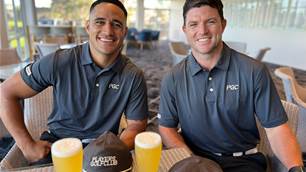For Inside Sport’s April 1992 edition, respected rugby league writer Neil Cadigan wrote this feature about Peter Sterling. On the field, Sterlo’s act was squeaky clean. Off the field, it had been a different story.
Brookvale Oval, the last game of the 1989 season. It's announced that Peter Sterling will abort his Australian career to play two seasons for Leeds in England. As he runs out in his last match for Parramatta, the Manly ground announcer asks for a salute to the champion from the Manly fans - the Eels' arch-rival club. Less than 15 minutes into the game, as Manly hooker Mal Cochrane is about to kick downfield, Sterling breaks from the ruck to pressure him. Cochrane steps clear, Sterling tumbles into a virtual sand bunker and rips the ligaments from his left ankle. Two days later Sterling is scheduled to fly to England, but the injury will sideline him at least until Christmas — halfway through the English season. He and Leeds decide to call the whole deal off and his biggest career change becomes an about-face. He's back to Parramatta for another season - or three or four.
April 1, 1990, North Sydney Oval. Peter Sterling is fearful he will become an April Fool. His right shoulder has never been 100 percent since the 1988 Test. He's aggravated it during the off-season and is a late starter in the premiership. This match is his long-awaited return. Minutes into the game, he dives into a tackle and emerges gingerly clutching the shoulder. Just a small tear of the ligament, they think, and the Eels' skipper rejoins his mates for most of the rest of the match which, as is becoming familiar, they lose. But further inspection shows that cutting and tying the ligament for the third time won't solve the problem. He needs a complete shoulder reconstruction. 1991 had come and gone in one frustrating match.
Over the ensuing six months, the "experts" will tell Sterling to retire. They're scared that an unsuccessful comeback will taint the memory of a marvellous career that saw him play a major role in the transformation of dead-beat Parramatta into the champions of the ‘80s, and overshadow his achievement in winning every award, team and individual, available to a player. Remember Langlands and the white boots? But never, never did he countenance the idea.
"It seemed to enter everyone else's mind but mine," he says. "The thing is that I believe, even if no one else does, that my best football is still to come. And if I stop believing that, why should I want to keep playing? Overall my game is not much affected by the years except in a good way - the longer I play, the more experienced I get and the better player I become. The nicest thing anyone's said about me was when [Western Suburbs coach] Warren Ryan said that I'm quick between the ears. As long as I don't lose that, I can compete."
Related Articles

Viva Las Vegas: Join Golf Australia magazine's Matt Cleary on a golf and rugby league spectacular

19 Holes With ... Chad Townsend and Val Holmes













